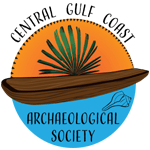TAMPA BAY ARCHAEOLOGY
Thursday, February 18th at 7 pm
Two winners of the 2019 Alliance for Weedon Island Archaeological Research and Education (AWIARE) and Levett Foundation Grant, Kendal Jackson and Heather Draskovich, will discuss their winning research in the Tampa Bay area. Read their lecture abstracts and biographies.
Kendal Jackson, Ph.D. Candidate, USF
Searching for Ancient Seascapes: Preliminary Results of Ongoing Geoarchaeological Investigations in Tampa Bay Estuary
Abstract: Like all estuaries, Tampa Bay is an exceptionally dynamic environment where the encroaching sea has transformed once-terrestrial landscapes into littoral ecosystems conditioned by patterns in salinity, surf, and tide. This history of near-constant change makes it difficult for archaeologists to understand the character and distribution of the ancient habitats utilized and managed by ancestral Native American communities. However, estuaries are also places of deposition where accumulating sediments often preserve a record of past environmental transformations. My present research in Tampa Bay is focused on reconstructing the ancient landscapes and seascapes that encompassed and surrounded habitation sites. In this talk, I’ll discuss an ongoing program of vibration coring, percussion coring, and excavation centered at well-preserved Woodland-period (ca. 1000 BC – AD 1050) midden-mound sites in Upper Tampa Bay, Cockroach Bay, and Weedon Island Preserve. Preliminary results reveal complex histories of marine flooding, seascape development, and transformation that contextualize archaeological patterns and inspire novel hypotheses for interpreting ancient shellworks.
Kendal Jackson is a Ph.D. candidate in Applied Anthropology at the University of South Florida. His research focuses on paleoenvironment and how past societies have shaped the trajectory of long-term ecological processes. His dissertation research is focused on understanding the roles that ancestral Native American societies played in the establishment and transformation of nearshore estuarine ecosystems across the late-Holocene.
Heather Draskovich, M.A. Student, USF
Rethinking Settlement Patterns at the Weeden Island Site (8PI1)
Abstract: The Weeden Island site (8PI1), despite its importance as a Weeden Island period (AD 200-900) ceremonial center and type site for the ceramic series bearing its name, has largely remained poorly-dated. With a limited amount of dates available to archaeologists, yielded from an intensive focus on only small portions of the site, there has continued to be a lack of the temporal and spatial control needed to answer many of the big questions involving change at the Weeden Island site. Through the execution of shovel testing in previously uninvestigated areas of the site, as well as analysis of material from past excavations, new radiocarbon dates have been obtained to help build a better chronology of the site. This research models newly acquired radiocarbon dates with those from previous research to aid in further understanding of the settlement patterning and landscape use of the Weeden Island site.
Heather Draskovich is a master’s student in the Department of Anthropology at the University of South Florida. Her research focuses on landscape use on a site-level scale around Tampa Bay. Her master’s research centers around the pre-Columbian settlement patterning and use of the Weeden Island site.


